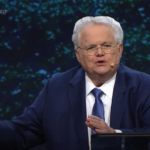Across numerous towns and cities in the US, it’s commonplace to find churches at every turn. Particularly if you reside in the southern regions, you’re likely to have around 10 churches within a short 10-minute drive from your home.
But are they all healthy? Are they thriving? Are their members growing?
How can you know?
Being part of a local church isn’t all about you or how the church benefits your family. But it’s important that Christians be part of a healthy church. Perhaps you’ve been called to pastor or play a role in rejuvenating a somewhat unhealthy church – that’s great, but only for a season.
So how can you recognize a healthy church? Let’s look at what the Bible has to say.
What is a Local Church?
But first, let’s clarify what defines a local church: A local church is a group of Christians who commit to gather on a regular basis to worship God and edify one another.
Where there is a consistent gathering of Christians committed to Jesus and one another – there is a church.
Do you gather on a consistent basis with fellow Christian believers you are committed to? You’re a church.
But notice the use of “consistent” and “commitment.” A group of Christians who gather together off and on whenever they feel like it, don’t really communicate outside of that gathering, and don’t really affirm that they’re operating as a church? This probably isn’t a church.
If you’re not committed to a local church, we’d highly recommend trying to find a quality local church near you.
Okay so we’ve defined what a local church is, now what makes a healthy church?

What the Bible Says About a Healthy Church
There’s no one place in the Bible that gives Q&A on what makes a healthy church. But there are a few passages that give helpful instruction on what the local church should look like and embody.
This is not every mention of what the church should look like. There are a number of passages on leadership, church discipline, and more that we won’t cover, but these four passages give us a great starting point.
The Early Church in Acts 2
All the believers devoted themselves to the apostles’ teaching, and to fellowship, and to sharing in meals (including the Lord’s Supper), and to prayer.
A deep sense of awe came over them all, and the apostles performed many miraculous signs and wonders. And all the believers met together in one place and shared everything they had. They sold their property and possessions and shared the money with those in need. They worshiped together at the Temple each day, met in homes for the Lord’s Supper, and shared their meals with great joy and generosity— all the while praising God and enjoying the goodwill of all the people. And each day the Lord added to their fellowship those who were being saved.
Acts 2:42-47
What the early church did isn’t necessarily a command on how our churches should look today. But they certainly got a lot of things right, and should serve as a helpful guide to how we do church 2,000 years later.
Here are a few things that marked the early church of Acts:
- They devoted themselves to the Apostles’ teaching (much of which makes up the New Testament)
- They fellowshipped regularly and ate together
- They devoted themselves to prayer
- They gave to and supported one another
Orderly Worship and Participation in 1 Corinthians 14
When you come together, each of you has a hymn, or a word of instruction, a revelation, a tongue or an interpretation. Everything must be done so that the church may be built up. If anyone speaks in a tongue, two—or at the most three—should speak, one at a time, and someone must interpret. If there is no interpreter, the speaker should keep quiet in the church and speak to himself and to God.
1 Corinthians 14:26b-28
It’s worth noting this instruction is coming on the heels of 3 chapters discussing prophecy, tongues, and orderly worship. Apparently the church at Corinth had hectic gatherings, where multiple people would attempt to share and there was lots of disorderly tongue speaking.
Nonetheless, it paints a picture of:
- Order and clarity
- Everyone participating – each person brought something to the table
- Everything being done that the church might be built up and edified
I think the participation piece here is largely overlooked in modern church gatherings where most people walk into a gathering, listen to a few songs, hear someone preach, shake a few hands, and leave. That is far from the experience the authors of the New Testament had in mind. We’re all called to participate.
Unity and Gifts in Ephesians 4
Always be humble and gentle. Be patient with each other, making allowance for each other’s faults because of your love. Make every effort to keep yourselves united in the Spirit, binding yourselves together with peace. For there is one body and one Spirit, just as you have been called to one glorious hope for the future…
Now these are the gifts Christ gave to the church: the apostles, the prophets, the evangelists, and the pastors and teachers. Their responsibility is to equip God’s people to do his work and build up the church, the body of Christ. This will continue until we all come to such unity in our faith and knowledge of God’s Son that we will be mature in the Lord, measuring up to the full and complete standard of Christ.
Ephesians 4:2-4, 11-13
In Ephesians, Paul calls the church to uncommon unity. He urges them to pursue oneness at all costs. And then he goes onto explain that everyone has been given unique gifts for the benefit of the church – to equip God’s people. We all have gifts to bring to the table that benefit others in our local church body.
Local Church Leadership in 1 Peter 5
To the elders among you, I appeal as a fellow elder, a witness of Christ’s sufferings and one who also will share in the glory to be revealed: Be shepherds of God’s flock that is under your care, serving as overseers—not because you must, but because you are willing, as God wants you to be; not greedy for money, but eager to serve; not lording it over those entrusted to you, but being examples to the flock. And when the Chief Shepherd appears, you will receive the crown of glory that will never fade away. Young men, in the same way be submissive to those who are older.
1 Peter 5:1-4
Peter lays out for us a picture of eldership. Even if a church doesn’t have an official “eldership,” the idea is that there would be wise and responsible oversight from a plurality of leaders. There is a ton of debate over exactly how this should look. But whether a church has a senior pastor + group of elders, a team of leaders, or an informal group of people who clearly lead out – there needs to be some form of leadership and oversight.
And based on my interpretation, there should be multiple people in leadership roles, shepherding and pastoring the flock. One person carrying all the weight is a recipe for disaster.
Mark Dever’s 9 Marks of a Healthy Church
Southern Baptist Pastor Mark Dever wrote a book in the 2000s called the 9 Marks of a Healthy Church. It’s full of wisdom on what marks a healthy church. His 9 marks are:
- Preaching
- Biblical Theology
- The Gospel
- Conversion
- Evangelism
- Membership
- Discipline
- Discipleship
- Leadership
All of these are drawn from the scriptures, and in my opinion, a really Biblical list. Mark Dever is a Southern Baptist, so obviously some denominations might disagree with how these play out practically in a local church, but overall – it’s a comprehensive list of things that should be seen in a healthy church.
Every Good Church Is a Little Messy
Keep in mind that a healthy church doesn’t mean a perfect church. There are no perfect churches on this side of eternity, because the church is made up of sinners. This doesn’t mean we can’t strive for near-perfect health, but it does mean things will always be a little messy. And that’s okay. We need to “make concession” for this as we commit to local churches. And we need to continue to love the church, no matter what it looks like for you in this season. You don’t have to go to church to be a Christian, but as a Christian, we’re called to commit to the church.
It’s also important to note that the church throughout history has always been reforming. We’re constantly working –not to evolve – but to get back to the roots of the church as Jesus and the Apostles saw it.
Though we’re far from perfect, as believers we’re called to love, serve, and protect the local church.
Our deep love for the church stems from God’s love for it. Christ cherished his people, sinners like us, enough to sacrifice his life (Acts 20:28; Ephesians 5:22–23; Revelation 21:2, 9–10; 22:17; Hebrews 2:11).
God’s plan isn’t about perfection, but for flawed people to depend on Jesus, revealing his grace in even the toughest moments. Although not every aspect of the church reflects His light perfectly, its glow is undeniable.
Despite seeing the church’s imperfections firsthand, Paul dedicated his life to its growth (Acts 20:24). We love the church, with its flaws and burdens, as it’s here we witness God’s grace overcoming our sins, reshaping us to mirror his Son. The world’s glimpse into this transformative journey glorifies Jesus, despite the church’s messiness.





